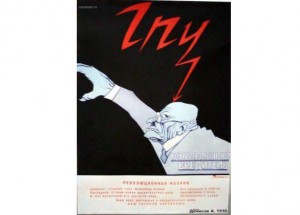Source: www.rucriminal.info
December 20 marks the 105th anniversary of the formation of the All-Russian Extraordinary Commission for Combating Counter-Revolution and Sabotage, better known as the Cheka. The FSB, FSO and SVR trace their history from the first Soviet special service, in a word, all those who today are (or consider themselves) the leading and guiding force of the Soviet-Russian society.
In recent years, the celebration of the "Day of the Chekist" quite well illustrated the general situation in the country - veterans of the KGB and representatives of the Russian Orthodox Church took part in the opening of the next monument to "Iron Felix"; at banquets, toasts were raised to the founder of the Cheka, Felix Dzerzhinsky, and the chief of the gendarmes, Alexander Benkendorf; Cossacks and an ensemble of the Ministry of Defense performed on the same stage. All this would hardly have been appreciated by our ancestors, but such a wildly absurd picture, an attempt to combine different symbols and meanings, created an image of national reconciliation, a feeling that the Civil War was over.
In the first months of Soviet power, the Bolsheviks could afford beautiful gestures. Human life was then valued cheaply, but at the turn of 1917-1918. even the tsarist general had a chance to leave the Cheka "on parole". A few months later, the Red Terror unfolded with might and main - the euphoria passed, some of the opponents of the Bolsheviks were not going to silently watch the collapse of their world. As in all other conflicts, the history of the Civil War was written by the victors. As a result, hundreds of millions of people around the world have created the image of the brave Chekists, who can uncover the conspiracy of the ambassadors and expose the agent network of the “belyaks”. It cannot be said that the Soviet state security worked inefficiently (one operation "Trust" is worth something), but the image of the Cheka in films and books from the times of the USSR has little to do with reality.
History loves to take unexpected turns, and without exaggeration, the abbreviation for 2022 can be called PMC. It sounds a little strange, but the image of “musicians” that is being created now in the official media and patriotic channels largely refers to the experience of the first Chekists. Effective, courageous, capable of solving the most difficult task, with a very simple, but understandable to the layman code of honor. Opposition resources offer a completely different picture - we can recall cases with the recruitment of prisoners, a sledgehammer, and recently detained Pavel Nikulin.
There is a concept that two Russias fought during the Civil War. The first, "European", sought to build a society according to the Western model - "The State for Man". The second, "Asian", defended the concept of "Man for the State". It took the Bolsheviks five years to destroy or expel their opponents from the country. And although the NEP a hundred years ago instilled optimism in many of those who remained, already in the 30s. terror again came to the homes of Soviet citizens, and both wealthy peasants and marshals fell under the flywheel of repression.
Is this experience relevant for modern Russia? Has the conflict between Europeans and Asians, Reds and Whites, Slavophiles and Westerners ended? Probably, when the elite, the notorious LOMs, and even ordinary Russians answer this question, we will finally acquire the image of the future that is so relevant now and will be able to explain to ourselves and our neighbors what kind of country we want to build.
Boris Kanin
Source: www.rucriminal.info






